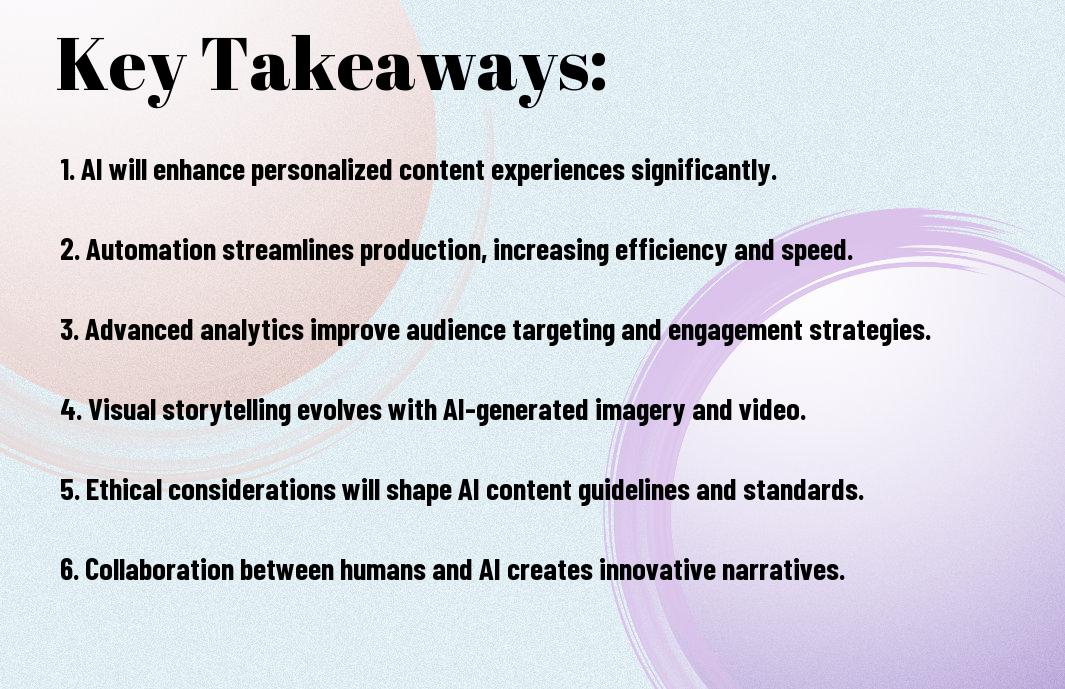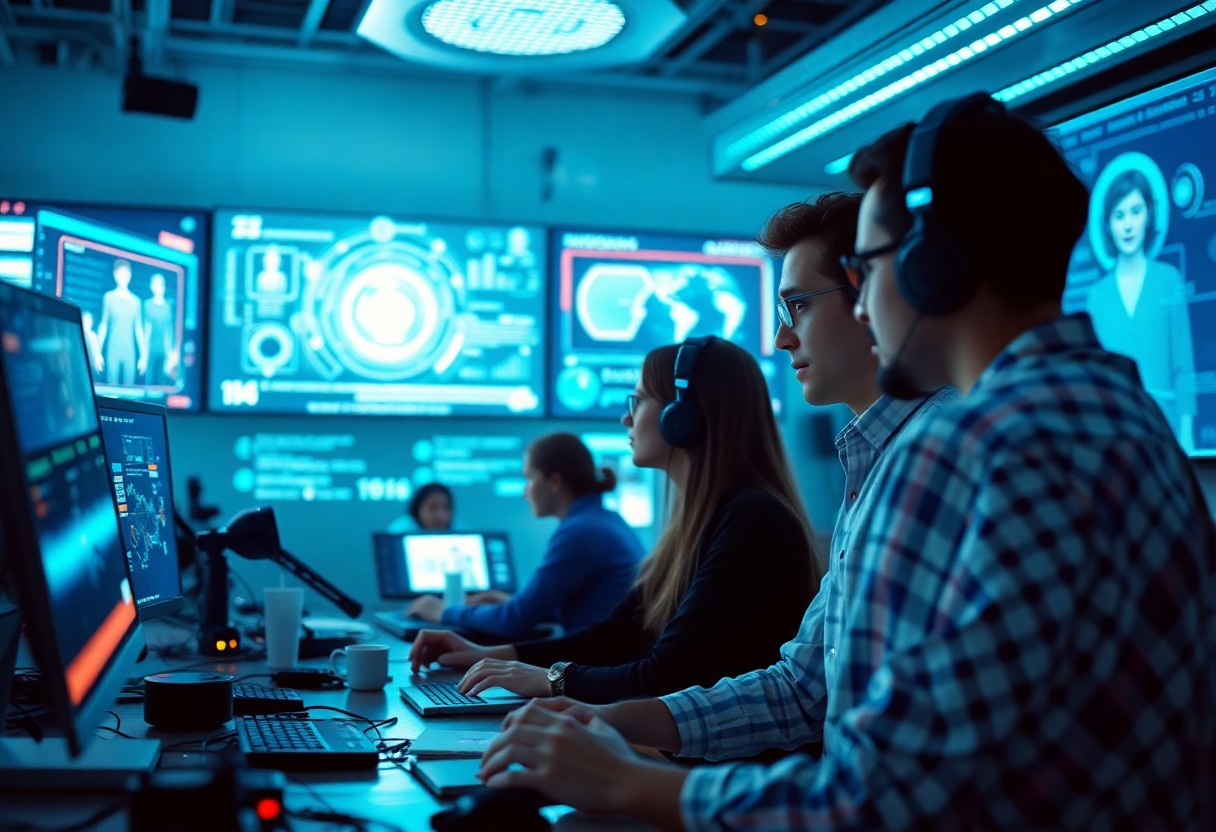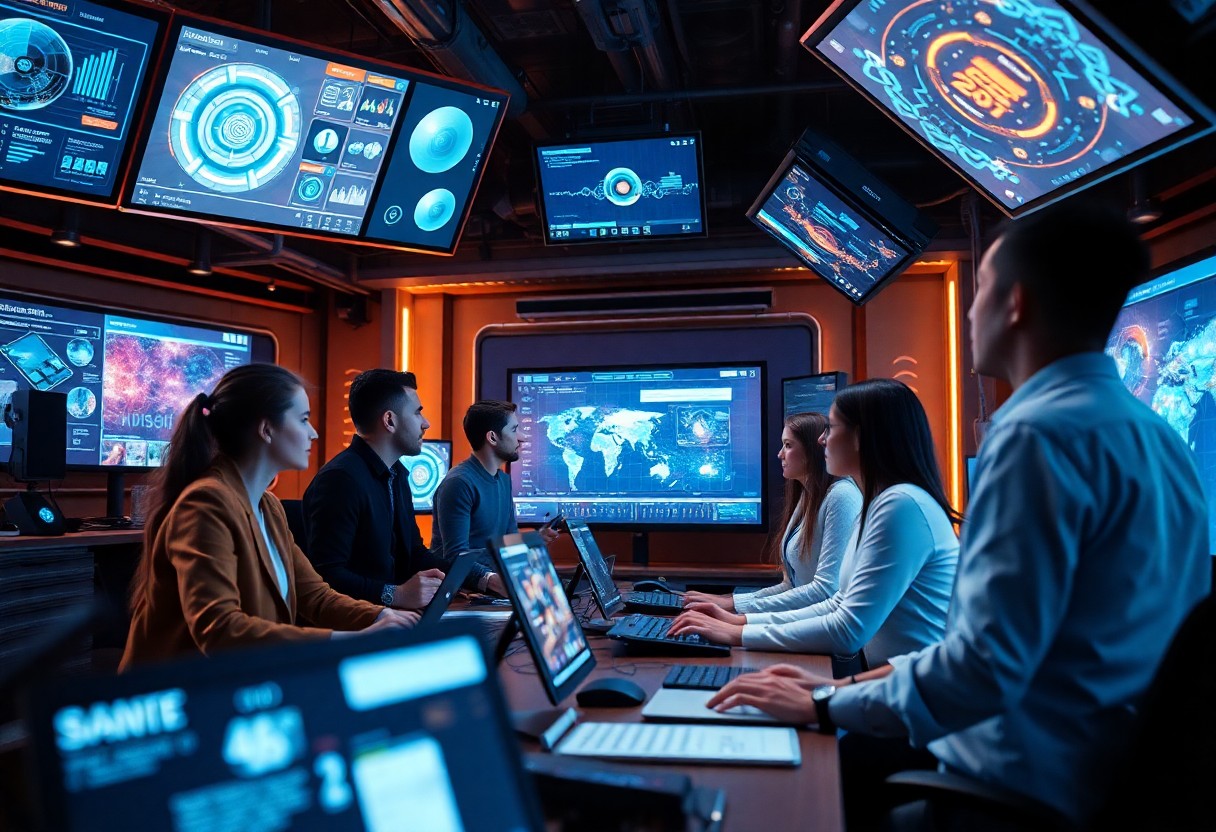
Most content creators are beginning to explore how AI innovations will reshape their workflows and output. As you navigate this rapidly evolving landscape, understanding key trends will empower you to harness AI’s potential effectively. From automatic content generation to personalized marketing strategies, AI offers opportunities to enhance your creativity and efficiency while also presenting challenges that demand a thoughtful approach. In this blog post, you’ll discover what to expect in the near future and how to adapt your strategies accordingly.

Key Takeaways:
- AI Personalization: Expect AI to create highly personalized content tailored to individual user preferences and behaviors.
- Automation of Content Generation: Automation tools will significantly streamline the content creation process, enabling faster production and delivery.
- Enhanced Creativity Tools: AI innovations will provide creators with advanced tools that augment creativity and inspire new ideas.
- Real-time Content Optimization: Content will be optimized in real-time using AI analytics, ensuring it is always relevant and engaging.
- Voice and Visual AI Integration: Expect a rise in voice and visual content generated by AI, enhancing user interaction through multimedia experiences.
- Improved Accessibility: AI will lead to enhanced accessibility features, making content creation and consumption more inclusive.
- Ethical Considerations: The evolving landscape will demand attention to ethical aspects of AI-generated content, including misinformation and bias mitigation.
Understanding AI Innovations in Content Creation
Before exploring future trends, it’s imperative to establish a solid foundation of what AI innovations mean in content creation. Understanding the intricacies of AI can help you navigate the evolving landscape and prepare for its transformative impact on your work.
Definition of AI in Content Creation
One of the most significant aspects of AI in content creation is its ability to analyze and generate information using complex algorithms. These algorithms can identify patterns in data, allowing for the automated creation of written content, videos, images, and even audio. Essentially, AI serves as a digital assistant, enhancing your creative output by managing repetitive tasks and offering insights that might not be immediately apparent.
AI does not simply regurgitate existing content; it learns from vast amounts of information and user interactions. This means that it can generate unique, relevant, and engaging materials tailored specifically to your audience’s preferences. The applications are endless, from personalized marketing messages to interactive chatbot dialogues, enabling you to create a more immersive experience for your audience.
Historical Overview of AI in Media
Content creation has not always been reliant on artificial intelligence. Content has traditionally been produced by human creators, driven by creativity, intuition, and cultural insights. However, as technology has progressed, AI began to infiltrate various media forms, reshaping the way content is produced and consumed. The journey of AI in media began with rule-based systems that offered basic automations, eventually paving the way for more sophisticated algorithms.
Content creation milestones, such as the rise of automated journalism in the early 2000s, showcased AI’s potential to not only assist but also generate entire news articles based on data inputs. As machine learning techniques evolved, AI systems became increasingly adept at producing high-quality content, sparking interest and investment in this innovative space.
It is important to recognize that AI’s role in media is not merely a trend but a fundamental shift in how information is disseminated. With platforms like GPT-3 and various content generation tools, creators now face a rapidly evolving environment that continuously reshapes their approaches to storytelling and audience engagement.
Key Technologies Driving AI Innovations
Behind the scene, several key technologies are powering the AI innovations within content creation, making it a domain of endless possibilities. Natural language processing (NLP) allows machines to understand, interpret, and generate human language in a way that feels authentic. Coupled with machine learning, AI can adapt and refine its outputs based on feedback, ensuring content remains relevant and engaging.
Further advancements in neural networks, particularly in deep learning, have contributed to significant improvements in visual and audio content generation. Such technologies can create realistic images, speaking avatars, and even music compositions, making them valuable assets in your content toolkit.
Understanding these technologies can empower you to leverage AI effectively, amplifying your creativity while reducing the time spent on mundane tasks. By embracing these advancements, you enable your work to stand out in a crowded digital landscape, ultimately enhancing your audience’s experience.


Emerging Trends in Content Creation
The landscape of content creation is rapidly evolving, influenced heavily by advancements in artificial intelligence. As you navigate these changes, it becomes imperative to stay informed about the latest Navigating the Future: AI Innovations in Content Creation. These trends are not only shaping how content is produced but also how it is consumed, offering a unique opportunity for creators to enhance their strategies and output.
Automated Content Generation
About automated content generation; it allows you to produce engaging articles, social media posts, and even video scripts with minimal human intervention. Tools leveraging natural language processing can create coherent and relevant content in a fraction of the time it would take you to do it manually. This technological capability enhances productivity while allowing you to focus on higher-level creative tasks.
Additionally, with the sharp increase in demand for content, these generating systems can help you maintain a steady flow of material for blogs, newsletters, and marketing campaigns. Though convenient, it is important to balance automated content with your unique voice to maintain authenticity and connect genuinely with your audience.
Personalization Through AI
Emerging technologies have made it easier than ever for you to personalize content for diverse audience segments. AI algorithms analyze data from user interactions, preferences, and demographics to create experiences tailored specifically to individual users. This degree of personalization leads to higher engagement rates and makes your audience feel understood and valued.
Hence, utilizing AI for personalization means you can streamline your marketing efforts and ensure that each piece of content resonates with its intended audience. By deploying targeted ads, customized recommendations, and personalized email communications, you significantly enhance user experience and drive customer loyalty.
Enhancing Creativity with AI Tools
Trends in AI are also influencing creativity in content creation. Innovative tools equipped with machine learning can assist you in brainstorming new ideas, generating unique visuals, and even composing music or sound effects that accompany your content. By integrating these tools, you can not only boost your creativity but also explore avenues that may have remained untapped in the past.
Furthermore, AI can act as a collaborator, providing feedback and suggestions that refine your work to enhance its impact. Leveraging these advancements allows you to experiment more and push the boundaries of your creative potential.
Enhancing creativity with AI tools opens a realm of possibilities for your projects. With AI as a creative partner, you can challenge traditional norms and explore innovative storytelling techniques, ultimately enriching your content creation process.
The Role of Natural Language Processing (NLP)
Unlike previous content creation methods that relied heavily on human intuition and manual effort, the advent of Natural Language Processing (NLP) brings a transformative impact on how content is generated, analyzed, and optimized. As AI technology evolves, you’ll find that NLP can significantly enhance the coherence and quality of the content you create. This shift enables content creators to focus on more strategic elements while allowing machines to handle repetitive and time-consuming tasks efficiently.
Advancements in NLP for Content Quality
On the frontier of AI, advancements in NLP are continuously improving the quality of content produced across various platforms. With the integration of machine learning algorithms, NLP tools can now analyze vast amounts of text to identify patterns, themes, and linguistic nuances that were previously challenging to detect. This enables you to craft content that is not just well-structured but also resonates more effectively with your target audience.
One significant advantage of modern NLP is the ability to provide real-time feedback on readability, tone, and even emotional impact. By leveraging NLP technologies, you can refine your writing process, ensuring that the content not only meets your expectations but also aligns with the preferences of your readers. This leads to increased engagement and a more profound connection with your audience, ultimately enhancing the success of your content strategy.
Applications of NLP in Different Content Types
Around the globe, NLP is being deployed across varied content types, offering tailored solutions for blogging, marketing, social media, and even academic writing. This versatility means that you can benefit from NLP tools regardless of the genre or format of your content. Whether you’re creating an engaging blog post, drafting a marketing email, or generating a social media update, NLP can streamline your process and refine your output for optimal results.
- Blogging: Enhanced writing assistance helps maintain reader engagement.
- Marketing: Automated analysis of customer sentiment shapes strategy.
- Social Media: Content tailored to trending topics boosts visibility.
- Academic Writing: Precise citation management and reference generation.
- News Articles: Automatic summarization aids in quickly crafting headlines.
After evaluating the specific use cases, you can see how NLP integrates seamlessly into your content workflows to improve efficiency and efficacy.
| Content Type | NLP Application |
| Blogging | Writing assistance and optimization |
| Marketing | Sentiment analysis and customer insights |
| Social Media | Trend analysis for timely posting |
| Academic Writing | Citation management tools |
| News Articles | Quick content summarization |
Challenges and Limitations of NLP
For all its benefits, the implementation of NLP in content creation is not without challenges. While advancements in AI have made NLP more sophisticated, there are still areas where it struggles—especially with understanding context, nuance, and cultural references. As a content creator, this may lead to situations where the technology misinterprets your message or produces content that does not fully capture the intended meaning. You must remain vigilant in reviewing and refining any machine-generated output.
Another significant limitation of NLP technology is its dependency on the quality of training data. If the data used to develop these models is biased or lacks diversity, you may encounter outputs that reflect these shortcomings. It is vital to engage with NLP tools critically and take responsibility for ensuring your content’s accuracy and quality. By combining human creativity with technological capabilities, you can harness the strengths of both while being mindful of their limitations.
Natural language processing undeniably presents both opportunities and challenges. As you integrate this technology into your content practices, it’s important to balance automation with personal insights to achieve the best possible outcomes. Be aware that while NLP can enhance your workflow, the need for human touch and discernment remains paramount.
The Impact of AI on Content Distribution
Many content creators are beginning to understand that the landscape of content distribution is changing dramatically due to advances in AI technologies. With these innovations, you can now reach your target audience more effectively than ever before. As AI continues to evolve, your strategies for promoting and disseminating your content will inevitably adapt. For a deeper probe this fascinating domain, check out the Future of AI-Generated Content – Potential of Chat GPT-4.
AI-Driven Content Recommendation Systems
Below, you will discover how AI-driven content recommendation systems have the power to enhance your content distribution. These systems analyze user behavior and preferences, allowing platforms to serve personalized content to their audiences. By leveraging these insights, you can significantly increase engagement rates, ensuring that your audience receives recommendations tailored specifically to their tastes. This leads not only to higher viewership but also fosters a deeper connection with your brand.
As you implement AI-driven recommendations, you create a more streamlined approach to content delivery, maximizing the potential of your efforts. With the right algorithms in play, your content has a better chance of reaching the right people at the right time, thereby boosting your overall effectiveness in the digital space.
Optimizing SEO with AI Insights
To effectively stand out in today’s crowded online landscape, utilizing AI insights for SEO optimization is a must. AI tools can analyze vast amounts of data to identify trends, keywords, and user interests that can help shape your content strategy. By understanding what audience segments are searching for, you can tailor your content to rank higher in search engines, driving traffic to your site.
Integrating AI into your SEO processes not only saves you time but also empowers you to make data-driven decisions. Instead of relying on intuition alone, you can leverage AI-generated insights to select keywords with high potential, analyze competition, and predict changes in user behavior that may impact your visibility. This proactive approach allows you to stay ahead in the dynamic world of content creation.
The Evolution of Social Media Algorithms
Optimizing your social media strategies requires an understanding of how social media algorithms have evolved through AI technologies. These algorithms are designed to curate content in ways that enhance user engagement and interaction. By grasping the nuances of these changes, you can position your content in front of the right audience on platforms that matter most to you.
The benefits of adapting to social media algorithm changes are substantial; you can find success in harnessing features like organic reach and targeted engagement, directing more traffic toward your content. As these platforms increasingly rely on sophisticated AI-driven models, understanding these shifts ensures that your content remains relevant and widely appreciated.
Social media continues to undergo changes as AI learns from user interactions and preferences. With every update, opportunities arise for enhanced visibility. By staying informed of these developments, you can continually refine your approach, adapting to algorithms that prioritize user satisfaction and engagement. This situational awareness will ultimately lead to a more effective distribution strategy.
Ethical Considerations in AI Content Creation
After exploring the fascinating advancements in AI-driven content creation, it’s imperative to investigate into the ethical considerations that accompany these technological innovations. As you navigate this evolving landscape, you should be aware of the implications of AI’s integration into your content strategies, particularly with regard to intellectual property, misinformation, and the need for transparency and accountability.
Intellectual Property Issues
An ongoing debate in AI content creation centers on intellectual property rights. When AI systems generate creative works, questions arise about who holds the rights to that content, and whether it infringes on existing copyrights. As a content creator, you might find yourself grappling with these issues, especially if your AI tools draw from a vast array of resources that include copyrighted materials. Understanding the legal landscape is vital to protect your work and the innovations brought forth by AI technologies.
Furthermore, considering the rapid pace of AI development, it is imperative for you to stay informed about changing legislation regarding AI-generated content. As guidelines evolve, it may impact how you use AI in your own creations, requiring you to consider potential future liabilities. Staying ahead of these changes is not only wise but necessary as you strive for originality and ownership in your content endeavors.
Misinformation and Deepfakes
Above the legal concerns sits a pressing ethical challenge—misinformation and deepfakes. With AI’s ability to create hyper-realistic content, the potential for misuse grows exponentially. You must be vigilant in your role as both a content creator and a consumer, as AI-generated misinformation can easily spread, damaging reputations and undermining public trust. The capacity for deepfakes can lead to serious societal implications, particularly in political contexts where fabricated information can influence public opinion and electoral outcomes.
To mitigate the risks associated with misinformation and deepfakes, it’s crucial for you to critically evaluate the sources of your information and the tools you utilize. Employing robust verification techniques and fostering a culture of responsible content consumption are imperative practices in combating the tide of misleading content. By doing so, you contribute to a more informed audience and a healthier media ecosystem.
The Importance of Transparency and Accountability
Among the ethical challenges facing AI content creators is the need for transparency and accountability. As you adopt AI tools, it’s important to disclose the use of such technologies in your content creation process. This not only builds trust with your audience but also fosters a culture of responsibility within the digital landscape. When your audience knows how content is generated, they are better equipped to critically assess it, which ultimately enhances their overall experience.
But the call for transparency doesn’t stop at disclosure; it extends to ensuring that the processes and algorithms behind AI-generated content are fair and unbiased. By actively engaging with these challenges and striving for clarity in your practices, you not only safeguard your credibility but also contribute to a more ethical future for content creation in the age of AI.

Case Studies of AI in Action
Once again, it’s necessary to examine real-world examples where AI has made significant strides in content creation. Below is a detailed list of impactful case studies that highlight the transformative role of AI in this space:
- The Washington Post: Utilizes the AI tool Heliograf to generate news articles, producing over 850 articles during the 2016 elections. The AI can generate concise, data-driven articles within seconds.
- BBC: Implemented AI-generated weather reports, significantly improving report production time. This allowed them to broadcast approximately 200k news stories more efficiently.
- Buzzfeed: Employed AI algorithms to analyze data trends and suggest content topics, resulting in a 30% increase in reader engagement for their articles created based on this data.
- Pandora: Developed Music Genome Project utilizing machine learning to personalize user experiences, which increased listener retention rate by 15%.
- Airbnb: Leverages AI to improve customer experience by generating personalized responses to over 4 million messages per week, enhancing user satisfaction metrics by 25%.
Successful AI Content Campaigns
Action-based campaigns that utilize AI technologies have shown remarkable success in enhancing marketing efforts. By leveraging automated content generation, brands can not only streamline their processes but also engage more effectively with their audiences. For instance, by using AI, companies can target specific demographics with highly tailored content, allowing for improved conversion rates and increased audience satisfaction.
The data from multiple campaigns illustrates that those who embraced AI saw an average increase of 15-20% in ROI when compared to traditional content strategies. This shift showcases how AI-driven campaigns not only generate efficient content but also adapt and refine their strategies on the fly, leading to continuously improving results.
Lessons Learned from AI Failures
On the flip side, your understanding of AI in content creation must also consider its failures. Mistakes made during AI implementation can often stem from a lack of clear objectives or improper data training. For example, numerous companies have suffered when their AI systems generated content that was off-brand or poorly aligned with their target market, resulting in negative audience reactions.
Exploring these lessons can offer you insights into what to avoid. Many businesses found that without proper oversight and human intervention, AI could produce content that inadvertently offended or confused audiences. Such scenarios underline the necessity of maintaining a balance between human creativity and AI efficiency.
At its core, these failures signal the importance of rigorous testing and continuous evaluation when integrating AI into your content creation strategy. Investing time and resources into building robust guidelines for AI systems can help in mitigating the potential pitfalls associated with their use and ensure they align with your brand message.
Insights from Industry Leaders
Learned from various industry leaders, the fusion of AI with content creation presents unprecedented opportunities for your business. Many experts assert that the future will be dominated by AI tools that can not only generate content but also analyze user preferences and trends. This feedback loop enhances creativity, allowing you to craft more engaging and relevant content that resonates with your audience.
Industry leaders consistently emphasize the significance of adaptive AI systems that evolve as audience trends shift. Due to this adaptability, your campaigns can remain fresh and maintain audience engagement over longer periods. Moreover, the analyses these leaders conducted showed that companies implementing adaptive AI saw a marked improvement in customer loyalty and engagement metrics.
Due to increased reliance on sophisticated AI solutions, it has become apparent that investing in education and training around these technologies is necessary for your workforce. Developing a deep understanding of AI capabilities will empower you to use them effectively, enhancing your content strategy and ultimately benefitting your audience engagement.
To Wrap Up
Upon reflecting on the evolution of content creation, it is clear that AI innovations are set to revolutionize the way you approach content. From automated writing tools that can generate blog posts in a matter of minutes to AI-driven design software that can create stunning visuals without the need for extensive design knowledge, the possibilities are expanding rapidly. You can expect that these advancements will not only save you time and effort but also enhance your creative processes, allowing you to focus on what really matters: connecting with your audience and delivering value.
As you look towards the future, staying updated on these innovations will be crucial for maintaining a competitive edge. Embracing AI technology can empower you to create more engaging and personalized content that resonates with your viewers. You will find that the integration of AI tools into your workflow can lead to stronger data insights, improved audience targeting, and a more dynamic range of content formats. By leveraging these advancements, you position yourself not just as a content creator but as a forward-thinking marketer ready to capture the attention of a continually evolving digital landscape.
FAQ
Q: What are some anticipated AI innovations in content creation?
A: Some notable AI innovations expected in content creation include advanced natural language generation tools that can produce high-quality written content with minimal input, AI-driven video editing software that can automatically compile highlights or create engaging visuals, and machine learning algorithms that analyze audience preferences to personalize content in real time. Additionally, AI is expected to enhance SEO strategies, allowing creators to produce content that ranks higher on search engines through smart keyword analysis.
Q: How will AI impact the role of content creators?
A: The role of content creators will evolve with AI assistance. While AI tools can take care of repetitive tasks, such as data analysis or basic content generation, creators will be able to focus more on strategy, creativity, and emotional engagement. This shift may lead to a new type of collaboration between human skills and AI technology, resulting in richer and more diverse content outputs.
Q: Will AI-generated content be of high quality and originality?
A: AI-generated content is expected to reach impressive levels of quality and originality due to ongoing advancements in machine learning and deep learning algorithms. With improved capabilities, AI can learn from vast amounts of data to produce coherent and sometimes even compelling narratives. However, the effectiveness still depends on the prompts and training data provided, emphasizing the importance of human oversight to ensure nuance and creativity in the final product.
Q: How can businesses leverage AI in their content marketing strategies?
A: Businesses can leverage AI by integrating tools that perform audience analysis, sentiment tracking, and performance monitoring of content. AI can help identify trending topics, suggest creative ideas, and optimize distribution strategies to reach the right audience effectively. Additionally, AI chatbots can enhance customer engagement by providing immediate assistance and personalized content recommendations, ultimately supporting marketing efforts.
Q: What ethical considerations should be taken into account with AI in content creation?
A: As AI takes on a larger role in content creation, ethical considerations become significant. Issues include the potential for plagiarism, the transparency of AI-generated work, and the responsibility of creators to acknowledge AI’s role. It’s imperative to consider the authenticity of messaging and the potential for misinformation. Moreover, there should be guidelines in place to regulate the use of AI in content creation to avoid biases and ensure fair representation in media.





